 Petzlover
Petzlover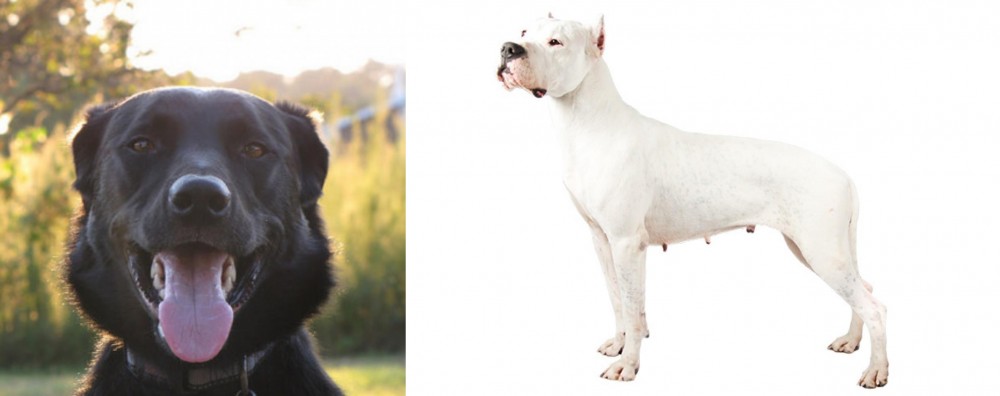 Borador is originated from United States but Argentine Dogo is originated from Argentina. Borador may grow 11 cm / 4 inches shorter than Argentine Dogo. Borador may weigh 19 kg / 41 pounds lesser than Argentine Dogo. Borador may live 3 years more than Argentine Dogo. Both Borador and Argentine Dogo has almost same litter size. Borador requires Moderate Maintenance. But Argentine Dogo requires Low Maintenance
Borador is originated from United States but Argentine Dogo is originated from Argentina. Borador may grow 11 cm / 4 inches shorter than Argentine Dogo. Borador may weigh 19 kg / 41 pounds lesser than Argentine Dogo. Borador may live 3 years more than Argentine Dogo. Both Borador and Argentine Dogo has almost same litter size. Borador requires Moderate Maintenance. But Argentine Dogo requires Low Maintenance
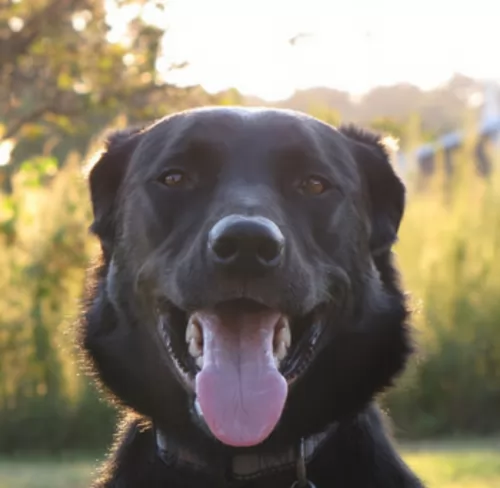 Hybrid breeds have become popular in the last decade or so. The Borador, hailing from Northern America, is one of these popular crossbreeds between two very popular dog breeds - the Border Collie and the Labrador Retriever. Between the two dog breeds, you get extraordinary intelligence, energy and a wonderful temperament.
Hybrid breeds have become popular in the last decade or so. The Borador, hailing from Northern America, is one of these popular crossbreeds between two very popular dog breeds - the Border Collie and the Labrador Retriever. Between the two dog breeds, you get extraordinary intelligence, energy and a wonderful temperament.
You first started hearing about this dog breed in the early 21st century. However each of the two breeds brought together to produce the Borador have got reasonable lengthy histories.
 Known also as the Argentinian Mastiff, this large dog breed from Argentina is a descendant of the extinct Fighting Dog of Cordoba. People were looking for a fearless, companionable dog, and a man, Martinez from Argentina, began a selective breeding program to get a breed that wasn’t essentially geared to fighting.
Known also as the Argentinian Mastiff, this large dog breed from Argentina is a descendant of the extinct Fighting Dog of Cordoba. People were looking for a fearless, companionable dog, and a man, Martinez from Argentina, began a selective breeding program to get a breed that wasn’t essentially geared to fighting.
A number of breeds were mixed to achieve the desired characteristics in the Argentine Dogo breed.
It is unfortunate that the dog has been used for fighting and that it comes across as a dangerous dog so that today it is banned in several countries.
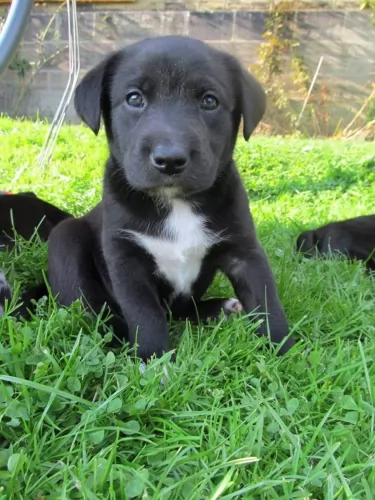 The Borador is a medium to large sized working dog which is well well-proportioned and muscular. His size can’t be carved in stone, but generally he will be in size from 40 – 57cm and weight in the region of 18 and 26 kg. His coat can vary significantly, leaning more towards one particular breed than the other. So the coat can be short and smooth or long and wavy or straight.
The Borador is a medium to large sized working dog which is well well-proportioned and muscular. His size can’t be carved in stone, but generally he will be in size from 40 – 57cm and weight in the region of 18 and 26 kg. His coat can vary significantly, leaning more towards one particular breed than the other. So the coat can be short and smooth or long and wavy or straight.
The Borador essentially has medium-sized ears which are floppy and the tail is medium-length. Sometimes the Borador will have the black and white coat of the Border Collie or he could have a brownish/beige colour from a golden Labrador.
When your energetic Borador is trained and socialized, he becomes a great family member and he gets on well with children and other pets.You’ll find that he often has the sweet, amicable temperament of the Labrador while having the sharp, alert intellect of the Border Collie.
Most Boradors are also good watchdogs and will bark at strangers, but because they are so amicable, from barking, they can quickly become a stranger’s friend.
 The Argentine Dogo is a striking looking dog, large, muscular and powerful looking. He stands at about 60 – 68cm and weighs about 35 – 45kg.
The Argentine Dogo is a striking looking dog, large, muscular and powerful looking. He stands at about 60 – 68cm and weighs about 35 – 45kg.
He has a pure white coat. The coat is short and smooth. The ears are high set and most times cropped and erect.The Dogo’s tail is long and hangs naturally.
The Argentine Dogo is a companion dog today who can be loving and loyal towards his human family. He is a strong willed dog with a distrust of strangers and other animals.
He will most certainly require training and socialization if you want him to behave well among people and animals. With proper training and socialization, he can make a good family pet.
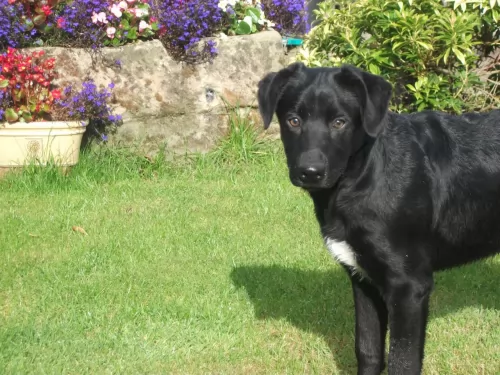 The Borador is an intelligent dog that can be trained. He is a sociable dog and is friendly to all members of his human family, willing to extend a paw of friendship to strangers as well.
The Borador is an intelligent dog that can be trained. He is a sociable dog and is friendly to all members of his human family, willing to extend a paw of friendship to strangers as well.
The Borador is also a friend of children and other pets. This combination of breeds is very energetic and you can’t just leave him for days on end in the backyard. He will need exercise and walks as well as ball games. When you become involved in his games, you tighten the bond between you and this is what this social, outgoing dog loves.
The Borador is going to make a wonderful pet because he is a mix of two very popular dog breeds. Give him all he deserves as a member of your family and you’ll have the perfect friend and companion for life.
 This big, muscular white dog with his short white coat was once a hunting dog so he is active and energetic. He is also intelligent and courageous, loving his human family and wanting to protect them being a strong characteristic of his.
This big, muscular white dog with his short white coat was once a hunting dog so he is active and energetic. He is also intelligent and courageous, loving his human family and wanting to protect them being a strong characteristic of his.
The Argentine Dogo is social, strong, loyal and devoted and just wants to be part of his human family and all their activities. It is important that he is trained and socialized at an early age because then he is obedient and relaxed around people and pets in the home.
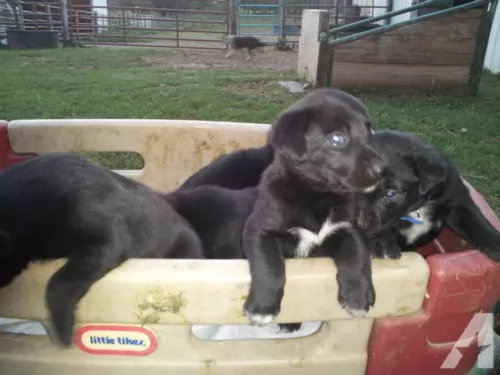 You won’t find serious health problems with your Boradors, as he is a robust breed. Nonetheless, there are some ailments that as a dog owner, you need to be aware of for your Borador.
You won’t find serious health problems with your Boradors, as he is a robust breed. Nonetheless, there are some ailments that as a dog owner, you need to be aware of for your Borador.
Skin ailments – you don’t want to see your dog scratching or licking continuously so you want to be aware of things like parasites and allergies. Skin diseases can be debilitating for a dog and can even require lifelong treatments. Yes, corticosteroids can help with itchy rashes, but the best move is to try and avoid skin ailments by ensuring a nutritious diet rich in minerals and vitamins and which includes some raw meat.
Always be checking your pet for skin problems such as ringworm, caused by a fungus and found on your dog and which appear as scaly patches and hair loss.
Hip Dysplasia – an inherited problem with the hip joints. No-one can predict when hip dysplasia settles in, but it can be as early as 4 months of age.Your dog shows signs of stiffness and may not be his energetic self. Some dog owners want to see certificates first that the parents of puppies have been hip-cleared before they buy a puppy.
 The Argentine Dogo can live to be between 10 and 12 years of age if he is looked after well, however about 10% of Argentine Dogos suffer from pigment-related deafness in one or both ears.
The Argentine Dogo can live to be between 10 and 12 years of age if he is looked after well, however about 10% of Argentine Dogos suffer from pigment-related deafness in one or both ears.
A dog can lose it’s hearing because of an ear infection. That is why it is so important to watch your pets ears and make sure that the ears aren’t red and that your pet isn't continually scratching his ears.
The most common cause of congenital deafness with a dog is pigment-related. Dogs with white coats are often affected by deafness and you commonly see deafness in dogs with white pigmented skin because they carry the piebald gene – the white coat and often blue eyes. Without a particular stem cell, the white dog’s body isn’t able to make a special layer of hearing cells.
There is a high rate of hip dysplasia with these dogs and more than 40% of Argentine Dogos have malformed hips. This isn’t a dog ailment to take lightly as it can lead to pain, discomfort and even lameness for your pet.
Skin diseases such as red, itchy allergies are also common with these dogs as well as eye diseases.
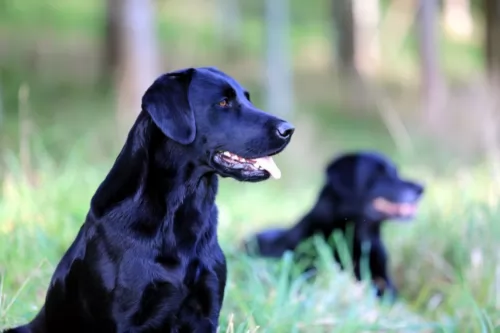 The Borador may have inherited the moderate shedder characteristics of the Border Collie or the more intense shedding of the Labrador Retriever. He will require a good brush at least twice a week to ensure you remove loose hairs so as to keep his coat shiny and healthy. Check your dogs ears too for yeast infections.
The Borador may have inherited the moderate shedder characteristics of the Border Collie or the more intense shedding of the Labrador Retriever. He will require a good brush at least twice a week to ensure you remove loose hairs so as to keep his coat shiny and healthy. Check your dogs ears too for yeast infections.
Puppies and young Boradors are full of energy and they will require a diet that has an excellent protein content. If you’re unsure about how to feed your Borador, speak to your vet as some dogs need more calories depending on their level of activity.
Certainly if your dog has allergies, you may have to look for a special diet but otherwise a top brand commercial dog food can be a good choice if you include some home prepared food such as rice, vegetables and meat. It is important to give your dog some raw meat every now and then as well. Always have a bowl of cool, fresh water available for your pet 24/7.
 With his short coat, the Argentine Dogo is a low maintenance dog, requiring a good brush twice a week. Its a pure white dog, and wiping him down with a damp cloth can keep his coat looking dazzling white and clean.
With his short coat, the Argentine Dogo is a low maintenance dog, requiring a good brush twice a week. Its a pure white dog, and wiping him down with a damp cloth can keep his coat looking dazzling white and clean.
Grooming your dog like this gives you a good chance to also check your pet for fleas and ticks and to ensure the skin is free from infection or dryness. You will find that he sheds a bit more in the hotter seasons, but during the colder months it will be wise to bring your pet indoors.
Other areas to consistently check with your dog are his nails – to keep them trimmed, to clean his teeth 2 or 3 times a week with proper canine toothbrush and toothpaste and to check his ears for infection.